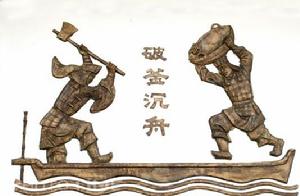Chinese Idioms (Vol. 4) Posted by sasha on Oct 25, 2011 in Culture
It’s been a while since our last post about Chinese idioms (成语 – chéng yǔ). In Chinese, the word for idiom literally means “to become a part of the language.” All idioms are composed of four characters, and most come from ancient literature. As such, the meaning of the idiom itself is usually more than the four characters on their own can describe. The overall meaning is linked to the story or myth from which it came. They can be difficult to understand, as they do not follow the usual grammatical structure and syntax of the modern Chinese spoken language. To catch you up on what we’ve covered already, here are the links to previous posts:
Part One – 班门弄斧 - bān mén nòng fǔ – “Wield the axe before Master Carpenter Luban”; 沉鱼落雁 – chén yú luò yàn – “Causing the fish to sink deep in water and the geese to fall to the ground”; 呆若木鸡 – dāi ruò mù jī – “Dumb as a wooden rooster”
Part Two – 半面之交 – bàn miàn zhī jiāo – “A nodding acquantaince”; 大公无私 – dà gōng wú sī – “Be impartial and unselfish”; 孤注一掷 – gū zhù yī zhì – “To concentrate one’s strength and resources on one thing”
Part Three – 痴人说梦 – chī rén shuō mèng – “A fool tells about his dreams”; 道听途说 – dào tīng tú shuō – “Roadside gossip”; 囫囵吞枣 – hú lún tūn zǎo – “Swallow the dates whole”
Now that you’re all caught up, let’s learn three new Chinese idioms!
半途而废 – bàn tú ér fèi – “Give up halfway”
According to this story, there was a man named Yue Yang Zi (乐羊子) who lived during the Warring States Period (战国时期 – zhàn guó shí qī). Yue left home and his wife to pursue his studies, but returned after just about a year. Of course, his wife was shocked to see him home so soon, so she asked him if he had finished his studies more quickly than he had anticipated. He replied, “I’ve been away so long, I was just homesick” (出门时间长了想家 – chū mén shí jiān cháng le xiǎng jiā). His wife, who had been weaving, proceeded to take a pair of scissors and cut the cloth she had been working on. “What’s the difference between me wasting time on this cloth and you wasting time on your studies?” she asked her husband. Yue felt ashamed about giving up, and he felt moved by his wife, so he headed back out to continue his education. Seven years later, he returned as an official.
This idiom is used in a derogatory sense for someone who has given up, but it is also used to motivate people to continue to work hard.
HERE is a good video of this idiom from the Chinese website YouKu.
家喻户晓 – jiā yù hù xiǎo – “well known; understood by everyone”
The history of this idiom comes from a story about a woman named Liang. One day, there was a fire inside of her house while she was out. When she returned home, she noticed the house up in flames, and realized that her nephew and her own child were trapped in the house. She bravely ran into the burning house, attempting to save her brother’s child first. However, the smoke blocked her vision, and when she got outside it became clear that she had rescued her own child first. Afraid of being criticized for being selfish, she rushed back into the fire to save her nephew. Sadly, the fire was too strong, and Liang burned to death. Of course, everyone in the village knew about this tragedy.
As such, this idiom is used today to describe something that is known by everyone. For example, when you punch it into the popular Chinese search engine Baidu.com, one of the pictures you get is of Ronald McDonald, or the “well-known McDonald’s uncle” (家喻户晓的麦当劳叔叔 -jiā yù hù xiǎo de mài dāng láo shū shu).
HERE’S another YouKu video showing the story of this idiom.
破釜沉舟 – pò fǔ chén zhōu – “break the woks and sink the boats”
This story dates back to the Qin Dynasty (秦朝 – Qín cháo) (221-206 BC) and the Battle of Julu (巨鹿之戰 – jù lù zhī zhàn). Leading the Chu (楚) rebel forces was a man named Xiang Yu (项羽 – Xiàng Yǔ). After crossing the Zhang River (漳河 – zhāng hé ) into enemy territory, he ordered his troops to sink all of the boats and destroy all of the woks. He provided his soldiers rations for three-days, and they headed out to battle. Knowing that victory was the only way for them to survive, his troops fought hard for many days and eventually won the battle.
This idiom is used to describe one’s undying resolve to achieve a goal. It’s similar in English to saying “cross the Rubicon” or “the point of no return.”
A clip from a Chinese movie depicting the story of this famous idiom.

Build vocabulary, practice pronunciation, and more with Transparent Language Online. Available anytime, anywhere, on any device.
About the Author: sasha
Sasha is an English teacher, writer, photographer, and videographer from the great state of Michigan. Upon graduating from Michigan State University, he moved to China and spent 5+ years living, working, studying, and traveling there. He also studied Indonesian Language & Culture in Bali for a year. He and his wife run the travel blog Grateful Gypsies, and they're currently trying the digital nomad lifestyle across Latin America.







Comments:
Steven C. Poling Jr.:
I truly enjoy and support these articles. However, I must point out a few errors for the learners.
1.) 战国时期 – The pinyin for this, in Standard Mandarin, is zhàn guó shí qī.
2.) Pinyin computer-generated error.
出门时间长了想家 – Pinyin should be “chū mén shí jiān cháng le xiǎng jiā.” The computer often outputs the incorrect pinyin with 多音字。
3.) 项羽 – The pinyin should be Xiàng Yǔ.
4.) Please be careful. You switch back and forth between Simplified and Traditional characters.